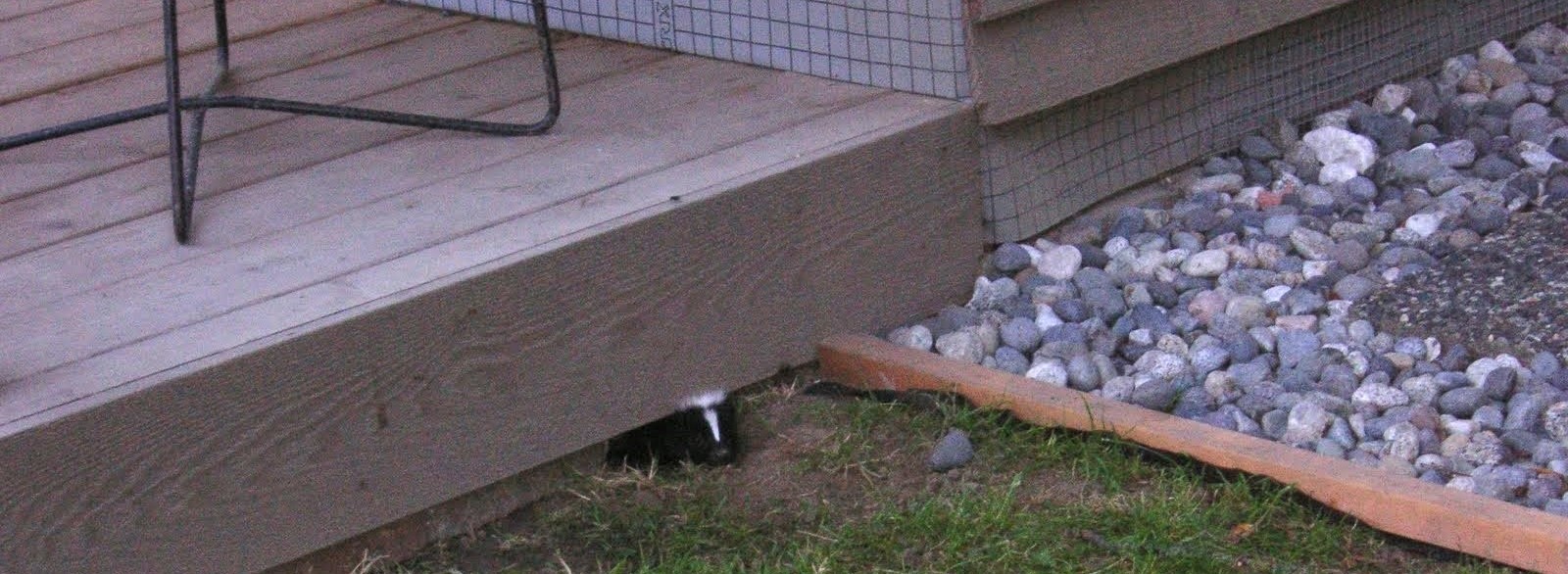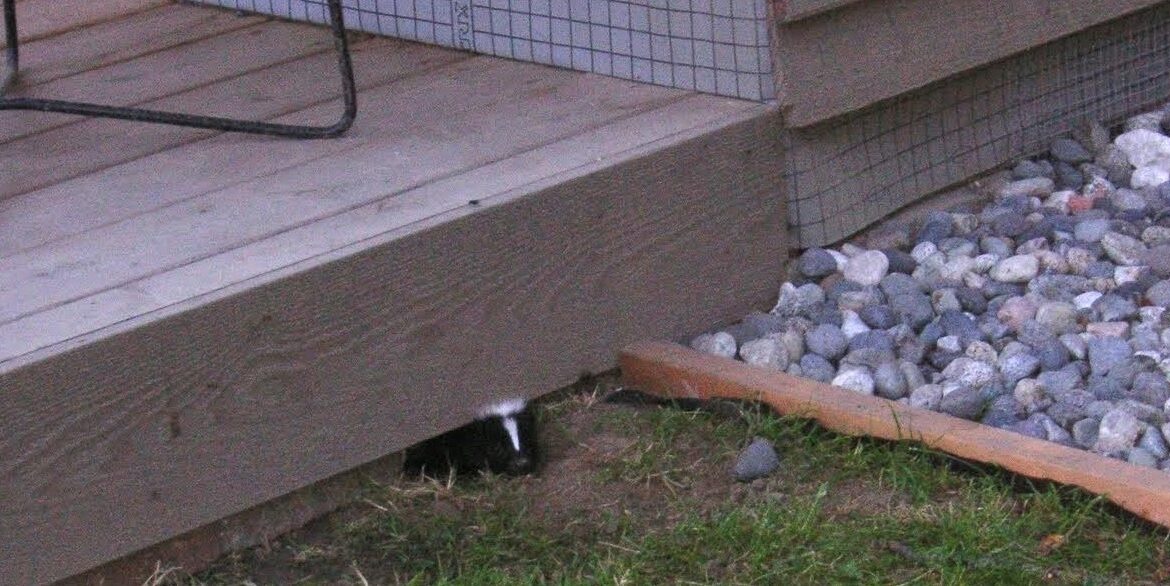Skunks often show up in St. Paul yards leaving behind telltale signs—cone-shaped holes from foraging, strong odors around decks and sheds, or the occasional late-night sighting. But the good news is, you don’t have to let them settle in. Preventing skunks in your yard starts with removing the food, shelter, and access points that make your property attractive to them.
Simple steps like securing garbage bins, sealing openings under decks, and reducing insect populations in your lawn can make a big difference right away. For longer-term protection, professional wildlife services such as Skedaddle Humane Wildlife Control in St.Paul offer thorough inspections, humane removal, and prevention strategies that stop skunks from coming back. By combining smart yard management with expert support, you can keep skunks from feeling at home and enjoy peace of mind all year long.
What Attracts Skunks to Urban Areas
Understanding why skunks choose to visit or settle in residential yards is the first step in skunk prevention. These animals are not looking for trouble, but for food, water, and safe shelter. Urban environments provide a surplus of resources that attract them close to homes and businesses.
Some factors make a property appealing to skunks:
- Easy access to unsecured trash or compost bins
- Pet food or bird seed left outdoors overnight
- Overgrown grass, dense shrubs, or wood piles
- Openings under decks, sheds, patios, and porches
- Grubs and insects in lawns or gardens
A big part of keeping skunks away is identifying these attractions and minimizing their availability. By recognizing what draws them in, you can adjust your property to make it less inviting to these determined diggers. With this foundation, let’s move into the practical methods of skunk-proofing your yard.
Direct Prevention Methods: Skunk-Proofing Your Yard
To effectively prevent skunks from making your property their home, skunk-proofing should focus on removing temptations and blocking potential entry points. We recommend a multi-layered approach that addresses common ways these animals find comfort and shelter around homes.
Our top recommendations for keeping skunks away include:
- Securing all garbage and compost bins with tight-fitting lids
- Removing outdoor food sources, such as pet food and fallen fruit
- Cleaning barbecue grills after use
- Installing high-quality fencing with the base buried at least 12 inches deep
- Using motion-activated lights to startle skunks at night
Fencing is particularly effective if installed properly. At Skedaddle, our technicians expertly dig and secure heavy-gauge steel mesh beneath decks and patios to ensure skunks and other wildlife can’t burrow through.
Homeowners can also use skunk repellents—commercial or natural, such as strong scents or predator urine—but these often provide only temporary relief. Reliable barriers and regular property maintenance offer lasting results.
If you suspect a skunk is already on your property, remember that safe, humane removal is necessary due to health risks and potential defensive spray. Our experienced team can assess the situation, remove animals, and ensure no future entry points go unnoticed.
As we continue, it’s important to recognize there’s more to prevention than barriers and repellents. The next layer involves understanding how your landscaping and the broader ecosystem can play a role.
Ecological Impacts and the Role of Healthy Landscapes
While many prevention guides focus solely on direct exclusion and repellents, a unique but often overlooked aspect of skunk prevention is the ecological impact of their presence and the role of the overall landscape.
Skunks are part of the local ecosystem and provide some benefits, such as eating insects and grubs that can damage lawns. Creating a balanced, healthy yard discourages them from taking up residence.
Here’s how landscaping can naturally reduce skunk presence:
- Use diverse plantings to attract predatory insects—and deter grubs that skunks feed on
- Keep grass trimmed and remove dense underbrush regularly
- Plant prickly or thick shrubs along potential den sites (like the edges of decks and outbuildings)
- Eliminate woodpiles and brush that could serve as shelter
- Fix leaky outdoor faucets or irrigation systems to limit water sources
A well-maintained landscape is less inviting to digging animals. By fostering plant diversity and reducing easy hiding places, your yard becomes both beautiful and less attractive to skunks. This ecological approach supports broader biodiversity while helping with prevention goals.
Legal and Safety Considerations for Skunk Removal
Handling wildlife, including skunks, on your property involves important legal and safety considerations. Minnesota law protects most wildlife species, and improper removal can pose severe risks—to people, animals, and the environment.
Key points every homeowner or business owner should know include:
- It is illegal in most cases to harm, relocate, or handle skunks without proper training and permits
- Skunks can carry diseases such as rabies, making untrained removal risky
- Use of poisons is not only ineffective but also illegal and dangerous to pets or non-target wildlife
- Professional services, like Skedaddle, use humane techniques that prioritize animal welfare and community safety
Our trained wildlife technicians safely remove skunks and ensure that all contaminated materials are cleaned up to prevent health issues for your family or employees.
If baby skunks are found, the removal process becomes even more delicate. Our specialists use thermal imaging and carefully relocate babies to heated baby reunion boxes, allowing mothers to move them to natural den sites once the area is secured.
The right approach keeps both people and animals safe and protects you from liability.
Professional Prevention and Long-Term Protection with Skedaddle
Skunk encounters in urban yards can be stressful, but the real key to prevention lies in taking measures that last. While repellents or quick fixes may offer temporary relief, skunks are determined diggers that will keep coming back if the environment feels inviting.
That’s why Skedaddle focuses on permanent prevention. Our technicians take a step-by-step approach that includes:
- Conducting a full property inspection to identify food sources and attractants
- Pinpointing weak points and potential den sites around structures
- Installing durable barriers, such as buried steel mesh, to block access under decks, sheds, and patios
- Reinforcing vulnerable areas to prevent future digging and burrowing
Our services combine humane removal, thorough clean-up, and long-lasting exclusion strategies. This means not only solving the immediate problem but also ensuring your property stays skunk-free in the future. With more than 30 years of experience, Skedaddle delivers solutions that protect families, pets, and homes while respecting wildlife.
Key Takeaways: Making Your Yard Skunk-Resistant
A comprehensive skunk prevention strategy for St. Paul property owners should include several key steps. Identify and eliminate attractants such as open garbage, pet food, and accessible water sources. Install physical barriers like deep-set screens or fencing to block entry. Schedule routine property inspections, especially during the fall and early spring, and maintain diverse and tidy landscaping to lessen the food and shelter available to skunks. Use professional, humane wildlife control services to address current skunk issues and guard against future invasions.
By layering these steps and remaining proactive, you make your property much less inviting to skunks while supporting a vibrant, healthy yard. From the direct removal and exclusion services offered by Skedaddle Humane Wildlife Control to the ecological insights we bring, we’re proud to empower our St. Paul neighbors with clear strategies and peace of mind.
Take Back Your Yard—The Humane Way
Taking swift action against skunks is about far more than preventing unpleasant smells; it’s about safeguarding your family, pets, and the long-term integrity of your property. The most effective defense combines blocking attractants, securing vulnerable structures, and nurturing a landscape that naturally discourages these animals from settling in. Professional expertise ensures that even hidden den sites and hard-to-reach spots under decks or sheds are addressed safely and humanely, without risking unnecessary harm to animals or your household.
Don’t let skunks get comfortable on your property—protect your home before the next season arrives. Call Skedaddle Humane Wildlife Control today and benefit from over 30 years of humane expertise, thorough clean-up, and long-lasting barriers. Trust our St. Paul team to help you reclaim your space and keep it skunk-free for the future.




